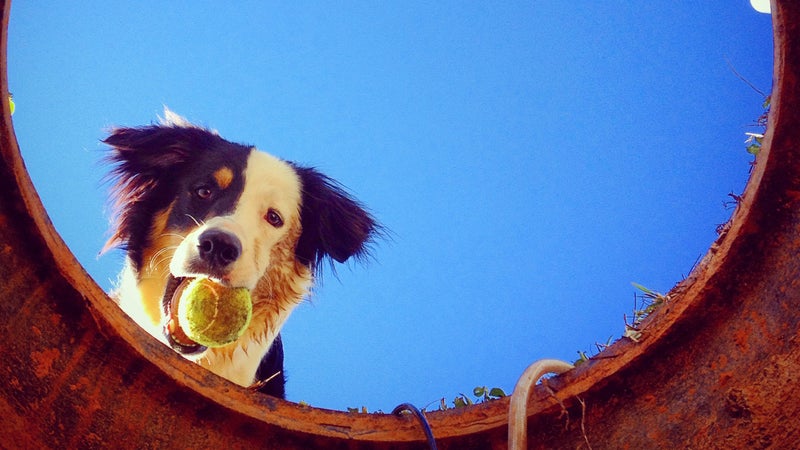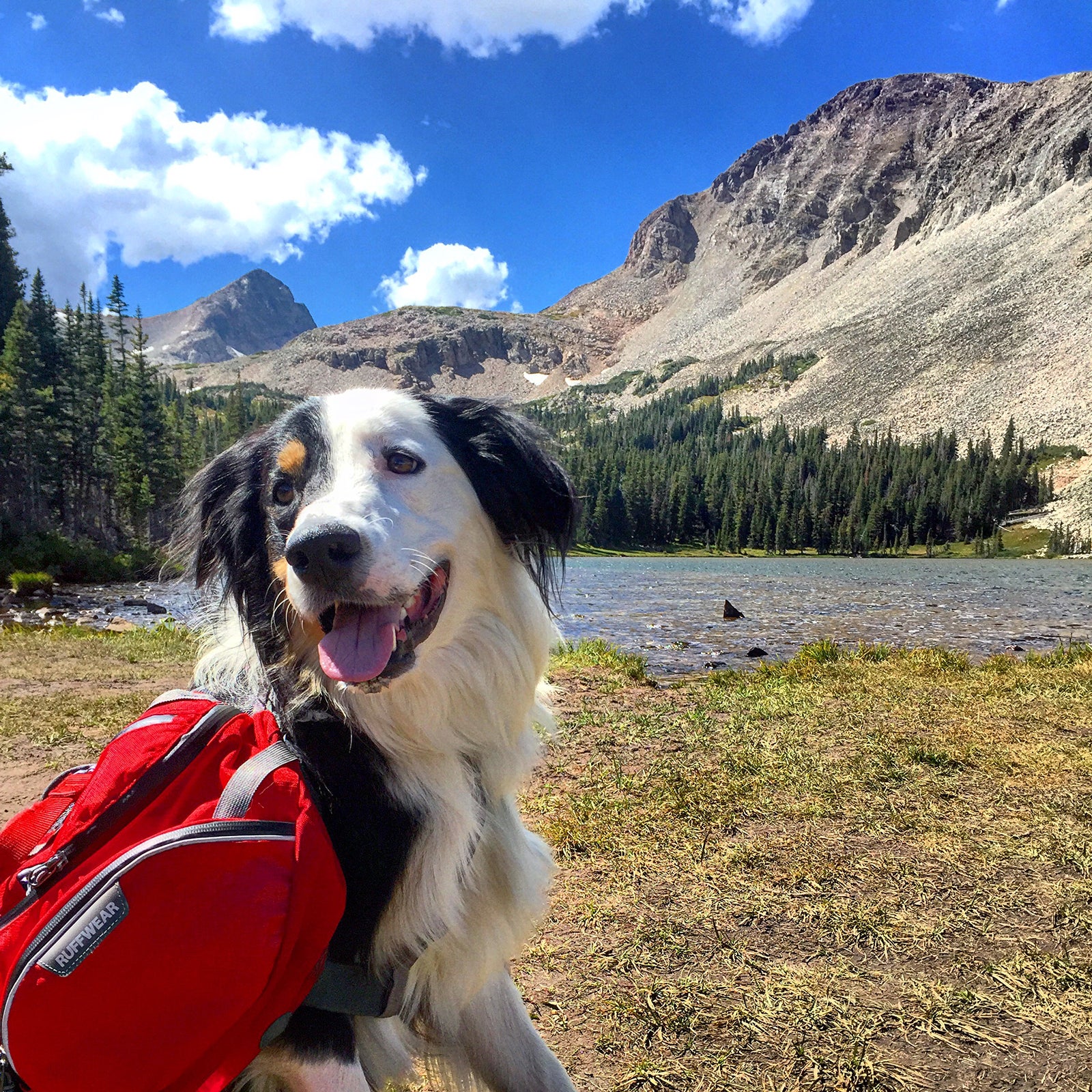All my life, IÔÇÖve been asked by my humans a boggling question: ÔÇťWhoÔÇÖs a good boy?ÔÇŁ
I have every right to assume that they must be talking about me. After all, I come when called, I sit and stay on command, I never help myself to the food they leave carelessly within my grasp.
And yet╠řthey ask and ask and ask. Do they really not know the answer? Do they expect me to tell them? Is it possible (as they would have me believe when I chase squirrels or bark in the car) that I might not╠řbe a good boy?
Finding no answers to these fundamental questions of life, I went to the woodsÔÇöas all good boys eventually mustÔÇöto see what I could make of these perplexing mysteries.
That is, I watched my humans pack the car for an inordinately long amount of time╠řand then sat in the back, patiently holding my bladder, as they bombarded me with high-decibel music for nearly eight hours until we arrived in the High Sierra.
Like John MuirÔÇÖs , I have found great solace in the mountains. For many hours I contemplated the tall and wondrous trees, which╠řdrop at their bases the finest of sticks. Cool, clear pools of glacial melt make for sublime crescendos to an enervating game of fetch. The fauna, from the common ground squirrel to the delectable dipper, whose trills enchant even the baddest of bad dogs, all concatenate into a harmonious ecosystem of things to be chased. And yet╠řI must, as my humans have often reminded me, quell the base urges instilled in my bones by my ancestors, Canis lupus, lest I be called a bad boy. And yet, try as I might, sometimes I find myself falling back on ancient habits.
On a clear blue morning, one of my humans brought me outside to relieve myself. As I lifted my leg to douse a handsome ponderosa pine, I saw out of the corner of my eye╠řa sight that made my blood boil:╠řmy old nemesis,╠řrabbit. This impudent╠řrodentÔÇöfar too accustomed to the obedience of domesticated dogÔÇösat there confidently chewing grass, a vacant and puerile look in its eye. My human, who was (and far too often is) staring at his phone, never noticed the tourist-tamed vermin. I strained at the leash and barked, hoping to at least scare the creature into some humility. This, of course, elicited from my human only the most prosaic and perfunctory of admonitions.
As we carried on with the morning routine, I found myself reflecting back on a passage from ÔÇÖs that warned of the dangers of letting cute, cuddly, tasty rodents run rampant. ÔÇťIndeed,ÔÇŁ wrote Aldo, ÔÇťit is all too clear that every surviving oak is the product either of rabbit negligence or of rabbit scarcity.ÔÇŁ

Is not this, too, a paradox? My humans, who are wont to quote Leopold and the like at length, and paste stickers of those quotes on water bottles and bumpers, seem incapable of living by the words they preach. Otherwise╠řthey would certainly permit the killing, or at least the vigorous chewing, of tasty rabbits, which in turn would yield more oaks, and hence more sticks, the fetching of which produces the greatest preponderance of ÔÇťGood boy!ÔÇŁ exclamations of all dog activities.╠řAnd yet, not killing rabbits is paramount among the rules of the good boy code of conduct. How can a bad yield a good? Where does a good boy fit in the cycle?
My High Sierra idyll is going splendidly, when all of a sudden, on a promising evening when the sky blushes in salmon-roe and rainbow-trout-bellied hues, I hear my humans speaking.
ÔÇťSo, tomorrow then, weÔÇÖre going to Tuolumne.ÔÇŁ
ÔÇťAwww, good little boy, weÔÇÖre going to see little boy╠řlittle Tioga Pass Road!ÔÇŁ (Yes, this is really how the female human speaks to me and about me).
ÔÇťBut sadly, Mr. Tioga╠řthe dog cannot go with us.ÔÇŁ
ÔÇťAwww, poor little boy. But ╠řwill go stay with Uncle Chance and his friend Shoko and have so much fun and be a good little boy.ÔÇŁ
I can hardly believe my acutely perceptive dog ears, though I know they do not deceive me. After all, the whole point of this summer sojourn was to make a pilgrimage to the place I was named for, to see if I might not, in doing so, better understand my own essential nature and the answer to the riddle of good boyhood. Could it be that IÔÇÖd be left behind at the climactic moment of the entire trip? All night long, I find myself troubled, grumbling at the wind╠řand flattening my ears at cross words from my humans.
In the morning, the worst╠řis confirmed, and I am left with Uncle Chance and the aging canid╠řShoko, as the Subaru pulls away amid laughs and good spirits from all the human occupants therein. It is a familiar tale, a sad story I have been subjected to all my life. How many times have I seen a ÔÇťNo Dogs AllowedÔÇŁ sign? How often have I been left at home, told patronizingly to ÔÇťbe a good boy,ÔÇŁ and left to wonder whenÔÇönot when, but if!ÔÇömy humans will ever return and feed me?
Yosemite National Park, like all national parks, discriminates against my kind. Good boys are only permitted to be there on roads and sidewalks, never trails, and all the while tethered and enchained to their humans amid an unending cacophony of cars and roads and screaming children eating ice cream cones in a most indecorous way. My humans do their best; they let me roam without a leash╠řwhenever they can. But they, too, are hemmed in by the outlandish and draconian regulations of national parks. And as much as they might like to bring me with them, they fear the wrath of disgruntled rangers as much as I fear the most horrifying of human inventions:╠řthe vacuum cleaner.
As Shoko sleeps in the corner╠řand Uncle Chance eats some delicious-looking human food, I cannot help but notice the threatening world we live in.╠řIn the corner is a vacuumÔÇöaggressive noisemaker and cause of countless human fights. Who will snarl at that vacuum? On the porch, dadÔÇÖs favorite slippers stand in plain view of would-be thieves. Who will pee on those slippers to signify ownership? A mailman lurks in╠řshadows down the street, threatening at any moment to deliver bills╠řor junk mail. Who will ward off that mailman?
It is a terrifying world, and humans are, by and large, utterly incapable of navigating it safely themselves. Where would humans be without us by their side, I wonder? Ten thousand years back in the Stone Age, no doubt. A pathetic and pitiful thing is humankind:╠řpeople╠řhave no fur, are allergic to the sun, cannot swim for long periods in cold water, or cover their nose with their tail. They canÔÇÖt even lick their own butts, wiping instead with abrasive toilet paper! What kind of hygiene is that? Nay, without the help and eternal vigilance of Canis╠řlupus familiaris, Homo sapiens sapiens would no doubt perish from the earth.
How many times have I seen a ÔÇťNo Dogs AllowedÔÇŁ sign? How often have I been left at home, told patronizingly to ÔÇťbe a good boy,ÔÇŁ and left to wonder whenÔÇönot when, but if!ÔÇömy humans will ever return and feed me?
Perhaps this, then, is the meaning of my name. Perhaps it is no coincidence at all that I am named after a place where╠řI cannot go. It is one more subtle reminder of the great and╠řvast incompetence and╠řstupidity╠řof humans.
Why do my humans simultaneously ask me, ÔÇťWho is a good boy?ÔÇŁ and tell me, ÔÇťYou are a good boyÔÇŁ? Because they are too forgetful to recall the answer themselves! Why do they forbid me from eating rabbits and other small critters? Because they have no deep sense of ecology. Why do they name me after a place I cannot go? Simple: because they are too foolish not to.
For all things, there exists a balance. A╠řnatural, harmonious state of being. Yin and yang. A humanÔÇÖs place in things is to dole out proper amounts of dog food twice a day, make sure water bowls are filled, and use their upright stature and opposable thumbs to throw sticks, balls, and other fetchable projectiles. A dogÔÇÖs place is to be the brains of the operation,╠řmaintain eternal vigilance about the perpetually impending disasters of the world, and╠řlook after this impotent species called humankindÔÇöa creature which must be protected from itself.
This is the meaning of my name. This is the answer to the perpetual question. Who is a good boy? I am. Me. Tioga╠řthe dog.


